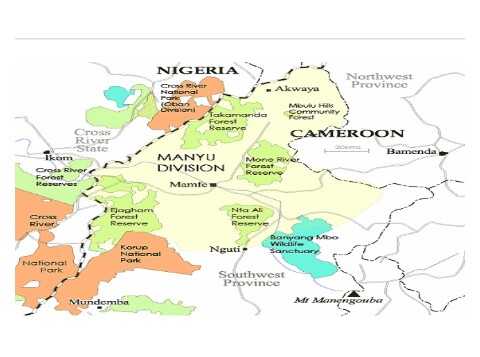The Manyu constituency indeed had enjoyed relative peace during the start of the Anglophone uprising in October 2016 following a simple boycott of the courts by Cameroon Common Law Lawyers. Throughout the months that follow, while students and teachers respected the civil disobedience campaign launched by the Cameroon Anglophone Civil Society and the boycott of schools throughout the entire Northwest and some parts of the Southwest including Lebialem Division, educational establishments in Manyu operated till the end of the first semester of the academic year 2016/2017.
From January 2017, the Anglophone crisis took a dramatic u-turn in Manyu following intensive calls by the teacher’s trade union for a total boycott of schools and support for ghost towns operations which drained the courts and the business community. Manyu businessmen, civil society leaders and lawyers joined the struggle to enforce the disobedience strategies used by the leadership of the Cameroon Anglophone Civil Society to ensure that the objectives were met- a measure which yielded 90 % success in all Southern Cameroons operations in Manyu and exposed the evil nature and greed of the Manyu political elites.
During this period, Manyu witnessed many killings, police brutality, the burning of schools and attacked on business premises. Things became even more intractable in the month of March 2017 following serious French Cameroun government threats via the administration headed by the then SDO for Manyu, Peter tieh Ndeh. Consequently, the teachers of both Basic and Secondary Educational institutions started heading back to school while parents raised the issue of insecurity on pupils and students.
Several meetings were held grouping the administration, the clergy and the business community to convince parents to send their children to school. These actions all met with a stone wall erected by calls to release all Southern Cameroonians arrested by the Francophone dominated army and police agencies.
The change of administration in Manyu meant a change in approach in handling the already hydra-headed ongoing crises. Peter tieh Ndeh, the Senior Divisional Officer for Manyu at the start of the Southern Cameroons revolution was transferred and replaced by OUM I I Joseph and things started falling apart. Many now believe Oum II’s approach has taken Manyu Division to the current state of the crisis. There are reasons why many in Manyu hold this anti Oum II opinion:
1- His messages were not good for public consumption. During an installation ceremony in Eyumojock, he made a mockery of Southern Cameroonians and warned of severe consequences if Manyus don’t stop the strike and ghost towns.
2-He ordered the shutting down of businesses and collected huge amounts of money from traders who respected the ghost towns to reopen their shops.
3-He reportedly provoked the burning of schools by stopping the circulation of bike riders including goods and services on non ghost town days.

